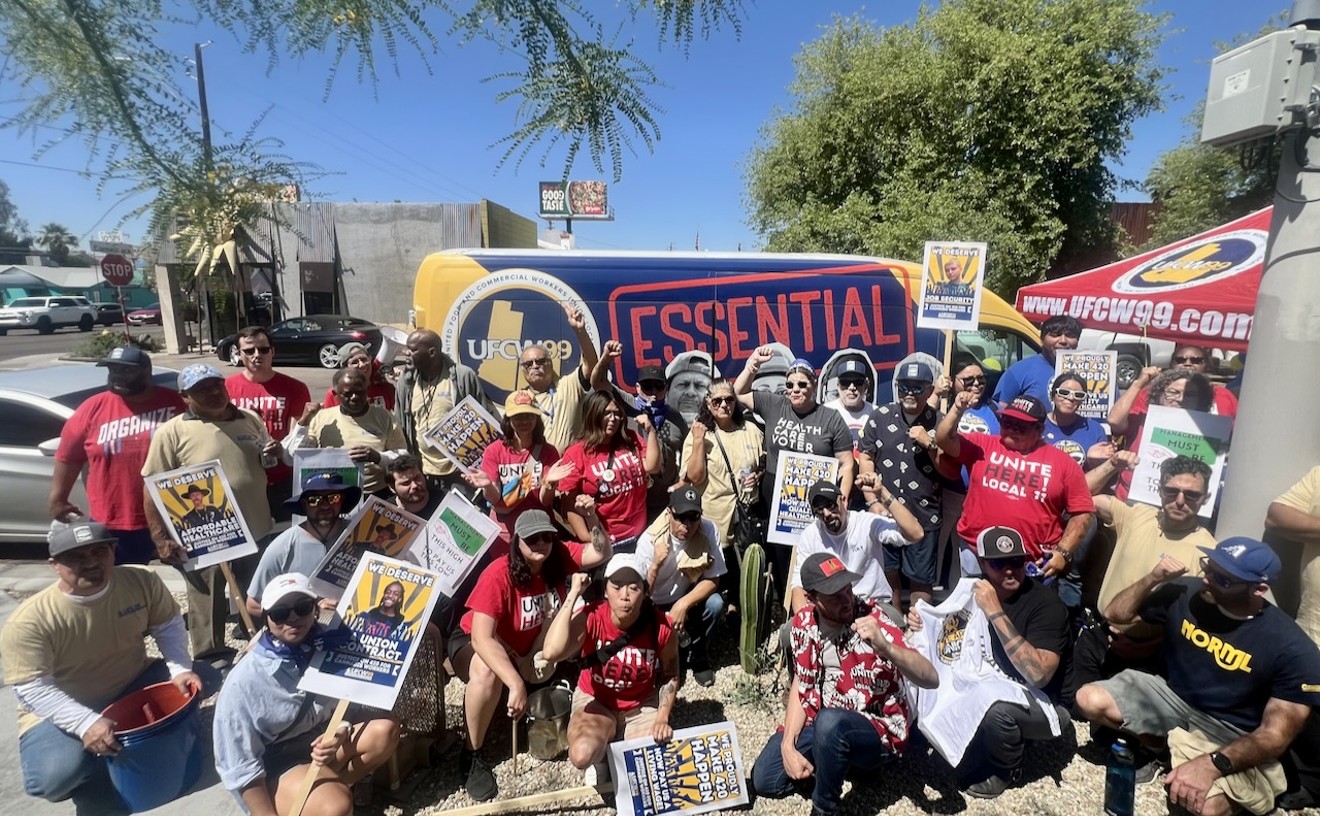He doesn't believe he deserves the dozens of complaints he's received about his new line of cannabis-oil products — because the complaints aren't actually about his products.
He's being blamed for bogus online ads about lesser products, made by other people, which may or may not contain cannabidiol (CBD), a non-psychoactive compound extracted from cannabis plants. But Williams is fighting back.
Last week, he filed a federal complaint in Florida to try to put a halt to the ads, which he claims originated from companies managed by Phoenix resident Tim Isaac.
Isaac, as the manager of three Arizona-based companies, encouraged or directed online marketing for at least 10 CBD products known by names including Hemptif CBD, Revive CBD Oil, Pure Isolate CBD, Sky CBD, and others, the complaint states.

Tim Isaac is a former weightlifter who was the first man ever to bench-press 800 pounds. He served five years in prison from 2009 to 2014 for scamming government benefits, cheating on his taxes, and importing a Viagra-like drug from China without a license.
New Times
Some of the ads embellished an April article in Forbes magazine about Williams' company, Lenitiv Labs, by freelance journalist Janet Burns. She penned a scorching article this week about Isaac and the lawsuit by Williams. Another fake ad was created to resemble an ABC News article.
At least 12 different websites hosted ads that clicked back to the sites that Isaac managed, the lawsuit states.
Montel Williams "uses two things to help ease the debilitating pain since his 1999 diagnoses of multiple sclerosis: snowboarding and Hemptif CBD," says the faux-ABC News article, which can still be seen online.
Williams hosted a talk show for 17 years starting in 1991, the lawsuit notes, winning an Emmy and other awards during his career. Isaac never tried to obtain permission to use the name of Williams' or Lenitiv Labs — and would have been refused if he had tried, the lawsuit states.
Williams' cannabis oil contains both CBD and THC, and can be sold only by state-authorized, medical-marijuana dispensaries. Isaac distributes his product line in all 50 states, as do numerous other CBD-only sellers.
Many people believe CBD has the ability to relieve pain, inflammation, seizures, anxiety, and other ailments, though scientific studies of its healing powers have not been conclusive. Whether the products that Isaac shipped to customers contained CBD isn't known.
Besides abusing Williams' name and reputation, Isaac's companies charged customers' credit cards repeatedly after initiating a "free trial" of CBD products, and made it difficult for customers to reach the company to stop the charges, according to the complaint and an article on RipoffReport.com. Isaac's three companies, Advanceable Technologies, Beauty Strong, and Snowflake Marketing, are each registered to a mailbox company in Scottsdale.
"It’s important to remember that these scams are anything but victimless. They are, in fact, calculated to prey on vulnerable consumers, many of whom have chronic illness or other disabilities," Williams' spokesman Jonathan Franks said in a statement sent to the media. "As explained in the complaint, we heard from elderly customers and veterans on fixed incomes who incurred unexpected overdraft fees as a result of these scams."
"The goal of the lawsuit is to stop these unauthorized uses as they are not only harming our clients, they are also harming the consumers who are being deceived," said lawyer Marc Rachman, who's representing Williams and Montel Williams Enterprises in the lawsuit against Isaac and the unnamed defendants.
Isaac denies the accusations, blaming the problems on other people who created the website ads. He acknowledged that his CBD products have nothing to do with Williams' company
His company sells the products by accepting referrals from the "affiliates" who make the ads, he said.
The affiliated marketers "need to grab attention" with the ads they make, he said. But when customers press the order button, "then it comes to me."
Last month, he stopped doing business with one affiliate who was "doing Montel Williams" ads, Isaac said, adding that he laments that "people are going to think I'm doing it."
"I'm tired of being blamed for stupid things," he said. "I'm tired of people trashing my name."

Images of Montel Williams, Lady Gaga, Morgan Freeman, and Whoopi Goldberg are used, along with fake quotes, in one of the many ads allegedly created by Isaac or his affiliate marketers.
In 1999, Isaac set a world record: He was the first man to ever bench-press 800 pounds, a feat covered at the time by Sports Illustrated. New Times profiled him in an article in 2000.
The son of a preacher, Isaac would occasionally volunteer at state juvenile detention facilities, proselytizing to incarcerated youth as he demonstrated weightlifting techniques.
New Times also reported Isaac's conviction in 2009 for selling a Viagra-type drug without prescriptions, cheating on his taxes, and fraudulently obtaining government benefits. He received a five-year prison sentence and was released in 2014.
Isaac said on Wednesday that he is the CEO of the CBD-selling company called Serenity, which he launched about four months ago. The complaint by Williams doesn't mention a company by that name. He has 15 employees at his Phoenix warehouse, he said, and dozens more customer-service workers. He declined to reveal an address for the business.
To make his products, he first obtains CBD-containing oil in 55-gallon barrels. The company puts the product into small, 1-ounce bottles and labels them. Each bottle contains 100 mg of CBD extracted from low-THC hemp plants, he said. He tests the product "probably once a month" to ensure quality, he claimed. He declined to say where he obtains the wholesale oil.
Isaac said he intends to defend himself vigorously against the lawsuit with the help of a local attorney.
"It is the greatest product out there," he said of his CBD line. "Until they tell people I can't do it, I'm going to help people."
Besides being nailed for selling the Chinese sexual-enhancement drug, Isaac and his father, Donald Isaac, had been involved in another venture called Pharmazone. A 2010 story by Channel 3 News (KTVK-TV) details how a 98-year-old woman accused Donald Isaac of scamming her out of $30,000, which he claimed was an investment for his company.
Court records show that both father and son were sued successfully over previous business ventures and had to pay tens of thousands of dollars in court judgments in the early 2000s. Donald Isaac now works as a pastor for the Renewed Hope Worship Center at 3400 East Melvin Street in Phoenix.
Below is the federal complaint against Tim Isaac by Montel Williams.
(Exhibits that accompany the complaint can be seen by clicking here.)












